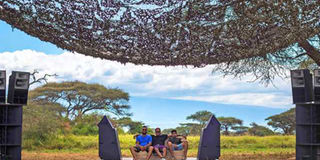Music, good times and a worthy cause in wild

The Midi Minds crew in Kimana Sanctuary. PHOTO | POOL
What you need to know:
- Tourism provides the primary revenue stream for this community, but millions of shillings were also raised for the sanctuary and the local economy through the Secret Shamba event.
- A few people that I’ve spoken to have argued that funds could have still been raised for the sanctuary by holding the event at a more typical venue for a music festival such as a nightclub in Westlands.
The use of Kenya’s national parks, reserves and other wild spaces for recreational purposes, particularly music festivals and sporting events, has been a contentious issue in the last few months.
Conservationists were understandably appalled by the decision to allow the 29th edition of the Koroga Festival to take place in Hell’s Gate National Park on Valentine’s Day. And, in July, the park will host the East African leg of the World Rally Championship.
While Hell’s Gate is a unique conservation area because it offers a range of recreational activities such as gorge walks, rock climbing and cycling, its suitability as a host of large-scale events attended by thousands of people is certainly questionable.
BREEDING COLONY
The park is recognised by Birdlife International as an Important Bird and Biodiversity Area of international significance, and is the only protected breeding colony of critically endangered Ruppell’s vultures in Kenya.
As critics of the Koroga Festival have consistently pointed out, the event exposed these and other threatened birds to disruptive levels of noise and night-time light.
While I generally think that Kenya’s wild spaces should be left wild, the occasional recreational event — if managed properly in the right location, and informed by a thorough environmental impact assessment — can have the potential to raise significant funds for conservation areas and their surrounding communities.
A good example was the Secret Shamba event held in Kimana Sanctuary a couple of weeks ago.
SANCTUARY
This 5,700-acre sanctuary is in the centre of a crucial wildlife corridor linking Amboseli National Park with the Chyulu Hills and Tsavo protected areas, providing animals with a safe route through the narrowest part of the space between two settled areas.
It is communally owned by 844 Maasais, who set aside the land as Kenya’s first community conservancy in 1996. Tourism provides the primary revenue stream for this community, but millions of shillings were also raised for the sanctuary and the local economy through the Secret Shamba event.
The concept of Secret Shamba was created by an ambitious group of DJs called Midi Minds Kenya, who sought to innovate the country’s social scene by organising small-scale events in areas of natural beauty for the benefit of communities and organisations that manage and protect these areas.
For the Kimana Sanctuary event, they partnered with Big Life Foundation, Marafiki and Ker and Downey Safaris, and gathered a line-up of well-known international DJs.
To mitigate the impact of the event on wildlife and local communities, the organisers ensured that ticket sales were limited to a maximum of just 250 people. The site was also within a few hundred metres of the sanctuary boundary, an area least used by wildlife.
NARROW ACCESS
Animals pass through a narrow access route while moving into and out of the sanctuary, which is adjacent to farms, houses and churches, and noise from Kimana and Isinet towns can he heard along the sanctuary’s boundaries throughout the year.
So the wildlife that use the corridor are highly habituated to human activity. Kimana Sanctuary is also the location of the biennial Masai Olympics — a two-day event attended by over 1,500 people, including 300 warriors who stay in the sanctuary to hold an overnight ceremony.
A few people that I’ve spoken to have argued that funds could have still been raised for the sanctuary by holding the event at a more typical venue for a music festival such as a nightclub in Westlands.
But by holding it in the sanctuary, the organisers were able to attract higher profile international DJs, and raise more money for the cause through higher ticket prices.
SUCCESS
However, the foundation of the event’s success was consideration of its impact on the sanctuary, wildlife and communities that protect them. Without this focus, such events can do considerable damage to wild spaces.
To register for future events, go to www.secretshamba.com.
Fox is Managing Director of iDC





